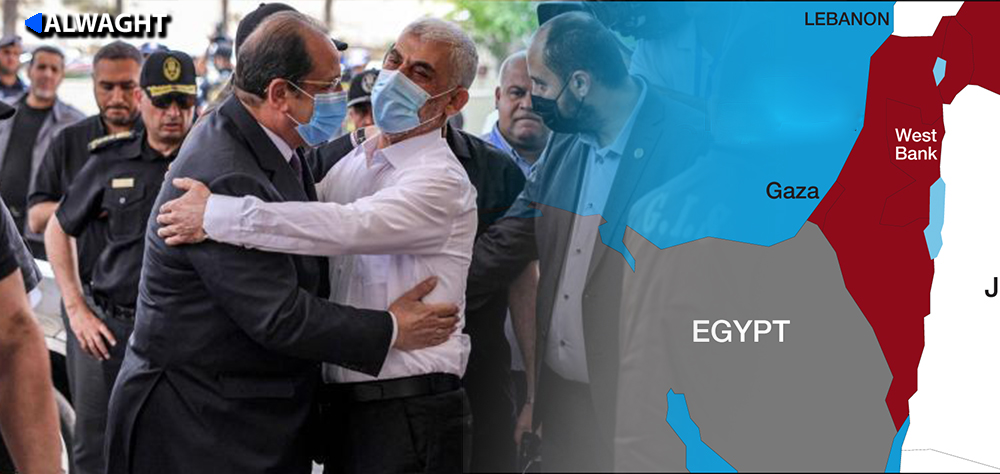Alwaght- Two weeks after Gaza ceasefire and end of clashes, the situation has not returned to normal yet. While the two sides have their own demands, the Director of the Egyptian General Intelligence Directorate Abbas Kamel in an important visit arrived in Gaza on Monday, following a visit to the Israeli regime.
The visit came at a time when Egypt has been the destination of visits by Western diplomats as well as Israeli officials in recent days. On June 25, the US Secretary of State Anthony Blinken arrived in Cairo to negotiate with the Egyptian government the Palestinian developments. Also, for the first time since 2008, Israeli foreign minister visited Egypt. The top Egyptian diplomat seems to be carrying the views and messages of the Israeli and Western sides for the Palestinian resistance. Egypt, seemingly, wants to solidify the now fragile ceasefire into a long-term one, and also discuss Gaza reconstruction.
Fragile truce and differences over agreement terms
In recent days, some actions by the Israeli regime, such as suppressing popular protests in the West Bank and tying the permission for delivery of reconstruction materials to Gaza to release of the Israeli prisoners held by Hamas have practically put the truce on a shaky ground.
Before Gaza visit, Kamel met Benjamin Netanyahu. According to Netanyahu's office, the Israeli prime minister asked the Egyptian intelligence chief to push for release of Israeli military personnel and civilians held by Hamas in Gaza as soon as possible. In 2014 Israeli war on Gaza, the Palestinian resistance captured two Israeli troops. Two Israeli settlers are, Israelis allege, also held by Hamas.
On the Palestinian side, Khalil al-Hayya, a member of Hamas political bureau, said after meeting Kamel: "It is no secret that progress has been made on the issue of prisoner swap before the war, but the Zionist regime does not seem ready to make a new agreement."
Resistance groups have threatened to keep their fingers on the trigger if the ceasefire is not implemented. Hamas insists that there can be no peace without lifting the siege.
Another important issue on the agenda of negotiations with the Israeli and Palestinian sides is the way reconstruction should be accomplished. Figures published show that the Israeli heavy bombardment destroyed 1,800 buildings, including high-rises, schools, factories, storehouses, and roads. Also the bombardment inflicted damages on Palestinian farming lands. This destruction comes as Gaza, under all-out Israeli siege for about 15 years, is experiencing dire economic conditions and is in desperate need for foreign aids.
The main challenge to the reconstruction is the Israeli regime, West, and the Palestinian Authority which are opposed to the delivery of the aids directly to Hamas. All of three sides fear weight gain of resistance approach against pro-compromise approach as one of the consequences of war and also success of Hamas in reconstruction of the besieged enclave. Tel Aviv and Palestinian Authority believe that any deal with Hamas means that the movement's military strategy against the Israeli occupation is working— something undermining Fatah acceptability and questioning Palestinian Authority's security cooperation with the Israeli regime in the eyes of the Palestinian public.
Cairo seeks to restore its role in intra-Palestinian differences
Egypt’s diplomacy has been more dynamic than any other regional actor since the escalation of tensions between the Israeli regime and Gaza, and has led to indirect ceasefire talks between Hamas and Tel Aviv. Egypt seeks to take the lead in the Palestinian developments, which has once again come to the forefront of the Arab and Islamic world developments, and many foreign actors, such as Turkey as Egypt's rival, are trying to play a role in it. But it should not be ignored that Egypt's constructive role is an outcome of the Hamas's long-term developments. Over the past few years, this movement, under Yahya Sinwar leadership, tried to separate ways from the Egyptian Muslim Brotherhood— banned by Cairo as a terrorist organization— and present itself as a partner capable of addressing the Egyptian security worries in Sinai Peninsula and Gaza Strip.
In addition to facilitation of the negotiations with Tel Aviv, Cairo has been active in the past two years in efforts to settle Hamas-Fatah disputes. Egyptians have been working to advance the national Palestinian reconciliation along with ceasefire to ease Palestinian Authority's concerns about being cornered. On Monday, Sinwar told the media that in the forthcoming days Cairo will host "serious talks" of the Palestinian groups to unite their positions.



























